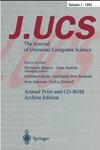Single-case learning analytics: Feasibility of a human-centered analytics approach to support doctoral education
IF 0.7
4区 计算机科学
Q4 COMPUTER SCIENCE, SOFTWARE ENGINEERING
引用次数: 0
Abstract
Recent advances in machine learning and natural language processing have the potential to transform human activity in many domains. The field of learning analytics has applied these techniques successfully to many areas of education but has not been able to permeate others, such as doctoral education. Indeed, doctoral education remains an under-researched area with widespread problems (high dropout rates, low mental well-being) and lacks technological support beyond very specialized tasks. The inherent uniqueness of the doctoral journey may help explain the lack of generalized solutions (technological or otherwise) to these challenges. We propose a novel approach to apply the aforementioned advances in computation to support doctoral education. Single-case learning analytics defines a process in which doctoral students, researchers, and computational elements collaborate to extract insights about a single (doctoral) learner's experience and learning process. The feasibility and added value of this approach are demonstrated using an authentic dataset collected by nine doctoral students over a period of at least two months. The insights from this exploratory proof-of-concept serve to spark a research agenda for future technological support of doctoral education, which is aligned with recent calls for more human-centred approaches to designing and implementing learning analytics technologies.个案学习分析:以人为中心的分析方法支持博士教育的可行性
机器学习和自然语言处理的最新进展有可能在许多领域改变人类活动。学习分析领域已经成功地将这些技术应用于许多教育领域,但尚未能够渗透到其他领域,例如博士教育。事实上,博士教育仍然是一个研究不足的领域,存在广泛的问题(高辍学率,低心理健康),并且在非常专业的任务之外缺乏技术支持。博士之旅的固有独特性可能有助于解释这些挑战缺乏通用的解决方案(技术或其他)。我们提出了一种新的方法来应用上述计算的进步来支持博士教育。单例学习分析定义了一个过程,在这个过程中,博士生、研究人员和计算元素协作提取单个(博士)学习者的经验和学习过程的见解。通过九名博士生在至少两个月的时间内收集的真实数据集,证明了该方法的可行性和附加价值。这一探索性概念验证的见解有助于激发未来博士教育技术支持的研究议程,这与最近呼吁更多以人为中心的方法来设计和实施学习分析技术是一致的。
本文章由计算机程序翻译,如有差异,请以英文原文为准。
求助全文
约1分钟内获得全文
求助全文
来源期刊

Journal of Universal Computer Science
工程技术-计算机:理论方法
CiteScore
2.70
自引率
0.00%
发文量
58
审稿时长
4-8 weeks
期刊介绍:
J.UCS - The Journal of Universal Computer Science - is a high-quality electronic publication that deals with all aspects of computer science. J.UCS has been appearing monthly since 1995 and is thus one of the oldest electronic journals with uninterrupted publication since its foundation.
 求助内容:
求助内容: 应助结果提醒方式:
应助结果提醒方式:


